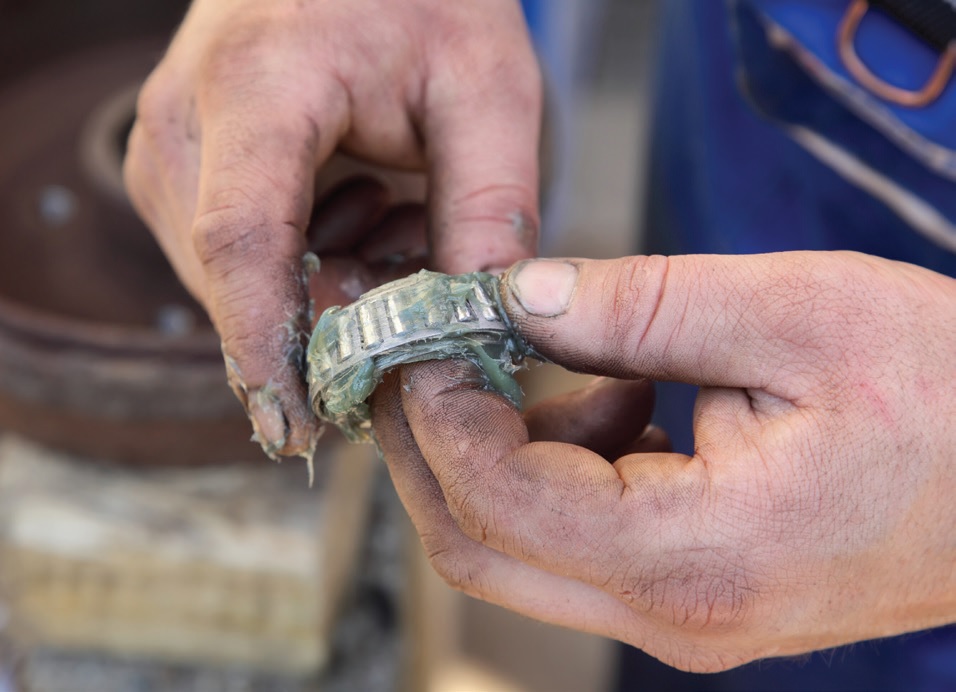The squeaky wheel
Evan Zabawski | TLT From the Editor July 2019
Various interpretations of a proverb.

The squeaky wheel fallacy is a very real concern in the field of lubrication.
© Can Stock Photo / sima
After the Second World War there was an exponential increase in the published usage of the proverb “the squeaky wheel gets the grease/oil” until about 20 years ago when it began falling out of favor. Could this be due to the varied interpretations? While it may seem straightforward that the implied meaning is that the most noticeable problem gets attention, a tribologist or lubrication engineer might disagree.
A tribologist or lubrication engineer would consider the suggestion that noise indicates a need for lubrication as reprehensible and that squeaking is more likely to indicate a need for replacement. By the time noise sets in, there is a strong possibility that internal damage leading to premature failure has occurred. This has led to the creation of a counter proverb, or antonymous proverb, “the squeaky wheel doesn’t always get the grease; sometimes it gets replaced.”
Counter proverbs are not meant to directly oppose a proverb but, rather, present an equally truthful opposing statement to indicate that the original proverb is not always correct or applicable. A classic example, “the early bird gets the worm,” can be countered with “the second mouse gets the cheese.”
Some cultural variations of the proverb are designed to encourage humility and conformity. In China there is a parable which says, “the loudest duck is the one that gets shot,” and Japan has a proverb that states “the nail/stake that stands up gets hit/hammered down.”
Such a viewpoint would suggest a counter proverb of “the squeaky wheel gets the grease, but sometimes the squeaky wheel needs to keep quiet and realize there are three other wheels doing the exact same job without complaining.” The squeaky wheel fallacy is a very real concern in the field of lubrication, as it is an issue of burden of proof. The traditional aphorism states, “absence of evidence is not evidence of absence,” meaning that though the other wheels do not squeak, it is not a correct assumption that they require no attention, therefore it can be desirous that one wheel squeaks on behalf of all the wheels.
Perhaps the squeaky wheel cannot be saved, but there is a good chance that assessing the lubrication of the remaining wheels will identify deficiencies. So, do the benefits to the remaining wheels outweigh the damage or replacement of the squeaky wheel? A lubrication engineer might argue that any squeaking indicates failure of the lubrication program, regardless of the scope of damage.
The fact that one wheel squeaked indicates it was under-lubricated, either from too little lubricant being applied or too long of a re-lubrication interval, though the likelihood is that all the wheels may be under-lubricated to varying degrees. Therefore, one squeaky wheel could be viewed as an indicator of a systemic issue rather than simply an isolated indicator of the sole wheel in need of attention. The proverb would be more fittingly edited as “the squeaky wheel calls for all of the wheels to be greased.”
A lubrication engineer also might argue that the act of greasing a squeaky wheel incorrectly draws attention away from the actual issue, since the squeaking may cease temporarily, but the situation might require further inspection. This leads to the proverb being edited further to a more presumptuous “the squeaky wheel gets replaced, and the rest get the grease.”
Such revisions are unrealistic, but the original proverb is overly simplistic, and heeding its advice will be unlikely to repair the problem(s). While I cannot suggest a proper replacement, I can only say that a squeaky wheel deserves more than grease, the other wheels must not be ignored, and the lubrication procedure should be reviewed to prevent future squeaky wheels.
Evan Zabawski, CLS, is the senior technical advisor for TestOil in Calgary, Alberta, Canada. You can reach him at ezabawski@testoil.com.